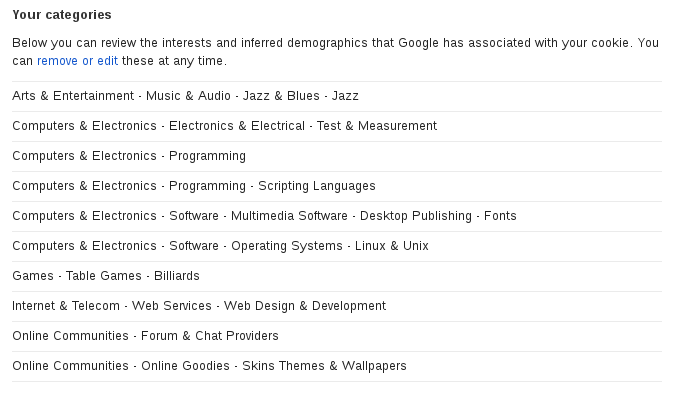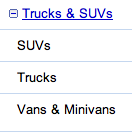User:Silviolorusso/thematic2/googleknowledge: Difference between revisions
No edit summary |
|||
| Line 60: | Line 60: | ||
<span style="font-size: 30px; line-height:40px;">What is missing? For instance Pornography, Feminism, Activism </span> | <span style="font-size: 30px; line-height:40px;">What is missing? For instance Pornography, Feminism, Activism </span> | ||
More info on interest based ads: http://www.google.com/ads/preferences/html/faq.html | More info on interest based ads: | ||
http://www.google.com/ads/preferences/html/faq.html | |||
http://support.google.com/adsense/bin/static.py?hl=en&gl=NL&client=ca-pub-1925688145189696&ts=1631343&page=ts.cs&adU=www.Plus500.nl&rd=3&contact=abg_afc&url=http:%2F%2Fwww.2createawebsite.com%2Fmoney%2Fgoogle-adsense.html&adT=Werken+Vanuit+Huis | |||
"The AdChoices icon appears on sites that use Google's AdSense program to show ads. While Google often shows you ads based on the content of the page you are viewing, we also show some ads based on the types of websites you visit, view, or where you interact with an ad or other Google product supported by Google's advertising services. In doing this, Google doesn't know your name or any other personal information about you. Google simply recognizes the number stored in your browser on the DoubleClick cookie, and shows ads related to the interest and inferred demographic categories associated with that cookie. It's our goal to make these ads as relevant and useful as possible for you. Google doesn't create categories, or show ads, based on sensitive topics such as race, religion, sexual orientation, or health." | |||
Revision as of 14:32, 10 February 2012
Human Knowledge according to Google
A perspective, a point of view, an interpretation on the archive does not only resides in the choice of documents –what to include or not–, but it's already developed when the categories and the structure of the archive itself are defined.
Aim: Highlighting meaning derived from the structure, not from the contents of the archive/database.
Google's mission: Organize the world’s information and make it universally accessible and useful.
In which way is Google organizing world's information? Is there a place in which one can access the system?
As regards the search engine the process is not completely transparent, but one can have access and even structure his/her own categories for adverts.

An example of categories guessed by Google for an 25 years old Irish good lad.
One can add categories and remove them. Google also tries to guess gender and age.
Counterinformative, paranoid alert: As a result Google is not only organizing world's information but also users by interests and search history.
Interesting examples of categories:
What is missing? For instance Pornography, Feminism, Activism
More info on interest based ads: http://www.google.com/ads/preferences/html/faq.html http://support.google.com/adsense/bin/static.py?hl=en&gl=NL&client=ca-pub-1925688145189696&ts=1631343&page=ts.cs&adU=www.Plus500.nl&rd=3&contact=abg_afc&url=http:%2F%2Fwww.2createawebsite.com%2Fmoney%2Fgoogle-adsense.html&adT=Werken+Vanuit+Huis
"The AdChoices icon appears on sites that use Google's AdSense program to show ads. While Google often shows you ads based on the content of the page you are viewing, we also show some ads based on the types of websites you visit, view, or where you interact with an ad or other Google product supported by Google's advertising services. In doing this, Google doesn't know your name or any other personal information about you. Google simply recognizes the number stored in your browser on the DoubleClick cookie, and shows ads related to the interest and inferred demographic categories associated with that cookie. It's our goal to make these ads as relevant and useful as possible for you. Google doesn't create categories, or show ads, based on sensitive topics such as race, religion, sexual orientation, or health."





